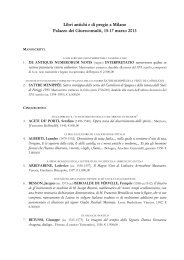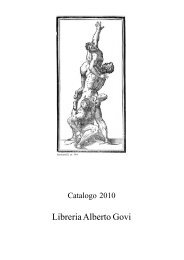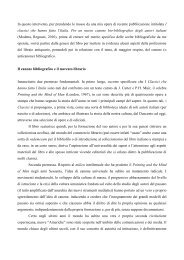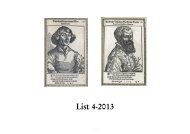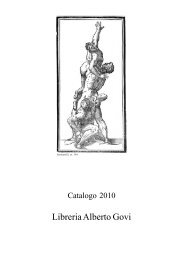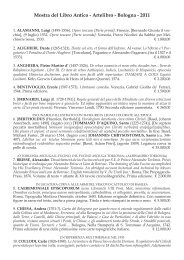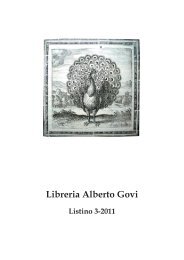art of drinking15) OPSOPOEUS, Vincentius (Vinzenz Heidecker, d. 1539). Die biecher...: von der kunst zutrinckenauß dem latein in unser Teutsch prach transferiert durch Gregorium Wickgram Gerichtsschreiber zu Colmar.Freiburg i.Br., Johannes Faber, 1537.4to. (54) leaves. With the printer’s device on the verso of the last leaf. Old boards, some light browning and spots,but a fine copy.EXTREMELY RARE FIRST GERMAN EDITION.This German translation was somtimes attributed(e.g. Deutsches Literatur-Lexikon, C.L. Lang, ed., Bern& Stuttgart, 1988, vol. 11, p. 694) to the German,poet, dramatist and novelist Georg Wickram (d.ca. 1562), also a native of Colmar in Alasatia, whohad founded a Meistersinger school there and wasthe author of the famous Rollwagenbüchlein (1555)and the novels Der Knabenspiegel (1554), Vom gutenund bösen Nachbarn (1556), and Der Goldfaden (1557).These are regarded as the earliest attempts in Germanliterature to create that modern type of middle-classfiction which ultimately took the place ofthe decadent medieval romance of chivalry. But effectivelythis translation was done by Gregor Wickram,a second cousin of Georg, and also a cousinof Vinzenz Obsopoeus. Gregor was a clerk to thecourt of Colmar and translated Erasmus’ epistle onthe death of Thomas More (1535). His translationof the Ars bibendi is more a German adaptation, anachieved literary production for it’s own accountand has numerous witty marginal glosses by GregorWickram (cf. E. Waldner, Zur Biographie Jörg Wickramsvon Colmar, in: “Zeitschrift für die Geschichtedes Oberrheins”, Neue Folge, 46, 1892, p. 328).Opsopoeus’ long poem in imitation ofOvid’s Ars amandi was first printed in 1536. He“called himself a moderationist but actually, he wasan exuberant drinker who thought that one couldstay just this side of the borderline. Of the same ilkwas his translator Gregorius Wickram… Amongthe writings on wine drinking the Ars bibendi ofObsopoeus occupies a unique place, not so much as a valuable historical document of the period, nor as a literaryproduction, but rather because of the character of the poem… Obsopoeus undertook a task as hopeful as the questfor the fountain of youth. He gave what he thought to be the means to drink all a man could want without becominga habitual inebriate. That he thought of himself as a moderationist is understandable, but it is curious thathistorians of literature refer to him as an exponent of moderation. What Obsopoeus meant by the ‘art’ of drinkingis to avoid becoming a sot. In the first book of the Ars bibendi the author promises: ‘I will give you fixed bonds fordrinking so that mind and feet may perform their duty’. What these bonds are, remained rather vague. The nearesthe came to any rule is: ‘Don’t get intoxicated or do so to the extent that drives away your cares. The amount thatlies between these limits is harmful’. Occasional gross intoxication did not seem to him to be dangerous: ‘Let a faultwhich occurs rarely be excusable. I revile daily intoxication’. The most important measure for achieving this goalseems to have been, in the view of our lusty philologist, to avoid situations in which a man may be forced to drinkbeyond his limits. In order to avoid such situations Obsopoeus advised that scholars should drink with scholars,merchants with merchants, carpenters with carpenters… In choosing his company the drinker should not only seekmen of similar educational and social level, but should avoid men of certain personality types. Obsopoeus seemsto have sensed on type of alcoholic addict, the type sometimes referred to nowadays as the ‘conflict drinker’… Inthe second book Obsopoeus dwells largely on descriptions of the evils of excess. There are many passages whichare illustrative of the mores of his times and the study of that book is well worth the reader’s time. In the third bookthere is more advice on how to keep within reasonable limits and how to avoid intoxication. The drinker should eatwell before drinking; he should eat bitter almonds, radishes, wild cabbage and chives…” (cf. E.M. Jellinek, Classicsof Alcohol Literature. A Specimen of Sixteenth-Century German Drink Literature: Obsopoeus’ ‘Art of Drinking’, in: “Addiction”,M. & M. Plant, eds., London & New York, 2008, vol. 2, pp. 40-41).Vincentius Opsopoeus was born in Bavaria as son of a cook. He was first a teacher at the choir school inSalzburg and continued his studies in Leipzig, Wittenberg and Nürnberg, where he became a member of the circlearound Willibald Pirkheimer. In 1524 he began to edit a series of Greek authors, partially in Latin translation. Thesehe produced mostly with the Haguenau press of Johann Setzter, first editions of Polybius (1530), Heliodorus (1531)and Diodorus Siculus (1539) and translated Lucian’s Hermotimus, and subsequently several more of his works.- 18 -
From 1528 he was rector of the newly founded Latin school in Ansbach, where he died (cf. A. Jegel, Der HumanistVinzenz Heidecker gen. Opsopoeus, in: “Archiv für Kulturgeschichte”, 20, 1940, pp. 27-84).VD 16, O-812; A. Hauffen, Die Trinkliteratur in Deutschland bis zum Ausgang des 16. Jahrhunderts, in: ”Vierteljahreschriftfür Litteraturgeschichte”, 2/1889, pp. 495-497; H. Kästner, Der Irrgänger im Schwarzwald. Jörg Wickrams‘Dialog von der Trunkenheit’ und die literarische Anti-Alkoholismus-Kampagne im 16. Jahrhundert, in: “Literatur und Kulturim deutschen Südwesten zwischen Renaissance und Aufklärung”, W. Kühlmann, ed., (Amsterdam & Atlanta,GA, 1995, pp. 94-95. € 2.500,00translated by Brucioli16) CICERO, Marcus Tullius Pseudo (106-43 B.C.) - BRUCIOLI, Antonio ed. (1497-1566). Rhetorica diMarco Tullio Cicerone, Tradotta di Latino in Lingua Toscana per Antonio Brucioli. Venezia, Bartolomeo Zanettifor Giovanni Giolito de’ Ferrari, 1538.8vo; modern vellum; (4), 91, (1) ll. Pastedown of the Florentinelawyer Fabrizio Frizzi Baccioni, on the title-pagesmall stamp of the prince Pietro Odescalchi (1789-1856),on the dedication leaf contemporary ownership entry:“ad usum fratris Antonini de chr.° or.min. reg. proe calabrie1546”. Wormholes in the white margin of the finalleaves, some foxing throughout, otherwise a good copy.FIRST EDITION, dedicated by the translator to GirolamoQuerini, of Antonio Brucioli’s Italian version ofthe Rhetorica ad Herennium (a work of uncertain author,variably attributed to Cicero or Cornificius, a rhetoricianfrom the I century b.C.). The translation was reprinted in1542 by Gabriele Giolito.Brucioli was born in Florence around 1497. Inhis youth, he attended the famous circle of humanistsand scholars who met in the Orto Oricellari. After 1522he traveled throughout Germany and France (especiallyLyons), where he encountered for the first time the newreformed ideas, that he tried to widespread in Italy allalong his life. After the flight of the Medici from Florencein 1527, Brucioli returned to his native city to take part inestablishing the Republic but for his religious thoughtshe quickly fell afoul of the dominant Savonarolan factionand was exiled in 1528. He than moved to Venice, wherehe spent much of the rest of his life. Together with hisbrothers Francesco and Alessandro, he founded a printinghouse and started a new business as bookseller. Between1530 and 1532 he published his Italian translationof the New and Old Testament, later placed on the Indexof Pope Paul IV. Brucioli was twice tried for heresy:the first time in 1547, when he fled to the tolerant courtof Ferrara and the protection of Renata d’Este; a secondtime in 1558, when he was forced to abjure. He spent most of the remainder of his life in extreme poverty. He diedat Venice in 1566 (cf. É. Boillet, ed., Antonio Brucioli. Humanisme et Évangélisme entre Réforme et Contre-Réforme, Actesdu colloque de Tours, 20-21 mai 2005, Paris, 2008, passim).Edit 16, CNCE38486; Adams, C-1702; G. Spini, Bibliografia delle opere di Antonio Brucioli, in: “La Bibliofilia”, XLII,1940, p. 166, no. 55; Bongi, I, p. 6. € 900,00Italian burlesque poetry17) SAMMELBAND containing four rare editions of the most outstanding representatives of Italianburlesque poetry. The first three works, all printed in 1538, are extant in second edition and form a kindof trilogy. The forth work, printed a year later, is here in first edition.Four works in one volume in octavo, bound in modern marbled boards.A special form of the comic in literature is the burlesque verse, consisting broadly in an imitation of‘high’ poetry with the object of exciting laughter, by distortion or exaggeration, by turning for example, the highlyrhetorical into bombast, the pathetic into mock-sentimental, and especially by a ludicrous contrast between thesubject and the style. The Homeric epic Batrachomachia, or Battle of the Frogs and Mice, is the earliest examplein classical literature. In Italian literature the burlesque verse was born and took its first steps among a fairly numerousseries of poets living in Tuscany during the late thirteenth to early fourteenth century. Although varyingin individual style, tone, and subject matter, they certainly form a distinctive group or genre when compared- 19 -
- Page 1 and 2: Catalogue 2013Libreria Alberto Govi
- Page 3 and 4: Catalogue 2013Libreria Alberto Govi
- Page 5 and 6: an hitherto unknown philosophical m
- Page 7 and 8: ustica Lib. X., edited by Giorgio M
- Page 9 and 10: the end is furthermore printed the
- Page 11 and 12: without typographical data, but pro
- Page 13 and 14: Letteratura Italiana”, CXL, 1963,
- Page 15 and 16: as secondary only.The present two e
- Page 17: position as secretary at the court
- Page 21 and 22: famous personage was in high favor
- Page 23 and 24: Luigi Alamanni and Antonio Brucioli
- Page 25 and 26: In Pincio’s biography of Bernardo
- Page 27 and 28: Tempio della Fama; e così ne trass
- Page 29 and 30: power, and yet to make it possible
- Page 31 and 32: lini, Andrea Alciati, Lilio Gregori
- Page 33 and 34: phy in particular, was presented as
- Page 35 and 36: quale quello che lui auspicava, e l
- Page 37 and 38: After the flight of the Medici from
- Page 39 and 40: to learn from their own experience
- Page 41 and 42: with some manuscript compositions p
- Page 43 and 44: death sentence issued against him o
- Page 45 and 46: the key work to Della Casa’s thou
- Page 47 and 48: important ones along with those of
- Page 49 and 50: a heavily annotated copy44) HORATIU
- Page 51 and 52: solitudine (1545), but undoubtedly
- Page 53 and 54: provide less description of patholo
- Page 55 and 56: the most up-to-date scientific ency
- Page 57 and 58: (pp. 4-10) written by the author hi
- Page 59 and 60: successivi alla consapevolezza che
- Page 61 and 62: night [February 22]. Rarely does a
- Page 63 and 64: subjects, including Saint-Gelais’
- Page 65 and 66: Catherine de’ Medici, succeeded o
- Page 67 and 68: losofico ed allegorico delle Metamo
- Page 69 and 70:
The act concerning primogeniture is
- Page 71 and 72:
are not many in number but who are
- Page 73 and 74:
the Camilletta, his first work, Gut
- Page 75 and 76:
selig, sich nit allein zu kunst geg
- Page 77 and 78:
dle, or low. There are, however, pr
- Page 79 and 80:
nity: ‘mercenaries should be done
- Page 81 and 82:
colò Sfondrati), to whom the Causa
- Page 83 and 84:
close of Semiramis’ career. Ninus
- Page 85 and 86:
e contenuti matematici in Henri de
- Page 87 and 88:
The first Hungarian dictionary - Cr
- Page 89 and 90:
& T. Kovács, Deutschlernen in den
- Page 91 and 92:
chitectura’ des Wenzel Dietterlin
- Page 93 and 94:
neo-Latin anthology devoted exclusi
- Page 95 and 96:
as De la puissance ecclésiastique
- Page 97 and 98:
colazione was not eaten first thing
- Page 99 and 100:
advanced both the technical and the
- Page 101 and 102:
di Giorgio Zorzi, ambasciatore in O
- Page 103 and 104:
the Misnah100) MISNAYOT MESUDAR NAS
- Page 105 and 106:
the task of taking part to the nego
- Page 107 and 108:
This is the only iconological work
- Page 109 and 110:
on that occasion, were described an
- Page 111 and 112:
millo Camilliani, Francesco’s son
- Page 113 and 114:
Blanchard, Correggio and Mignard, R
- Page 115 and 116:
di Cicerone d’ottime antiche stam
- Page 117 and 118:
Pietro Aretino125) MAZZUCHELLI, Gio
- Page 119 and 120:
music129) TESTORI, Carlo Giovanni (
- Page 121 and 122:
Vol. VIII (1773): pp. (6), 854 with
- Page 123 and 124:
Di Felice e Gregorio Fontana, 1905,
- Page 125 and 126:
Cicognara, no. 190 (“Nelle quattr
- Page 127 and 128:
mo: fonti, theorie, modelli, 1750-1
- Page 129 and 130:
commentary on the treaty on shabbat
- Page 131 and 132:
poet laureate of Austria, and he le
- Page 133 and 134:
geo-political situation of the regi
- Page 135 and 136:
ope collecting views and pictures o
- Page 137 and 138:
inc.), 100 numbered engraved plates
- Page 139 and 140:
a gift from Emperor Napoléon III t
- Page 141 and 142:
Ardène, no. 123Caprara, no. 103 Tr
- Page 143 and 144:
Speckle, no. 73 Besson, no. 60- 143



